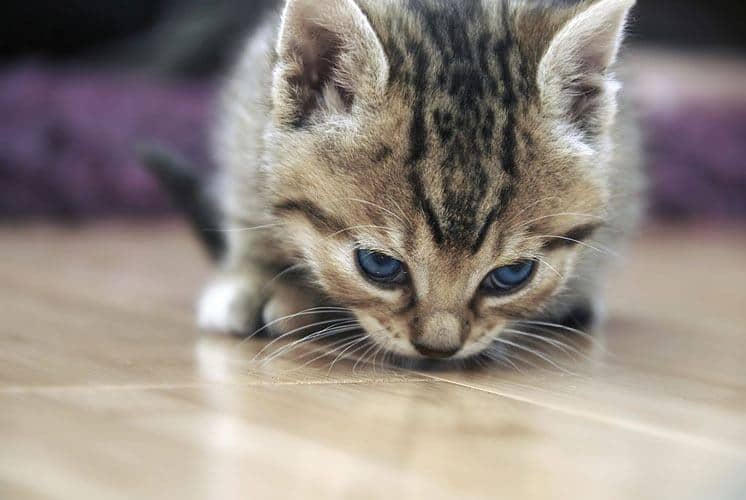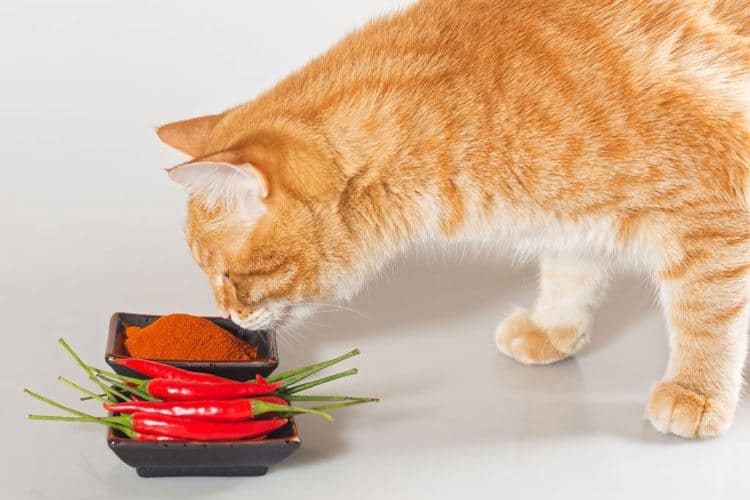Last Updated on 08/20/2021 by Veronica Jones
Cats are sometimes known for wanting things a certain way. They may not like it when you sleep in, make too much noise while they’re napping, or don’t get the right flavor of cat food. There are also certain smells that they don’t like. Since their noses are extremely sensitive, do your cat a favor and try to avoid these smells. On the flip side, you can use some of these smells as a natural deterrent if your cat is sticking their nose, or claws, in places they don’t belong.
Given that a cat’s nose contains up to 80 million olfactory receptors compared to a human’s five million, it’s no wonder that they can be a little more sensitive to smells than we are. Keep this in mind when you find a perfume or shampoo that you think is overpowering. Imagine what kind of work it’s doing on your cat’s nose. Along with overpowering smells, here are some others that a cat might find less than enticing.
- Dirty litter box: Cats are fastidiously clean animals. They spend the majority of their awake time grooming themselves. So, it should be no surprise that they hate the smell of a dirty litter box. Even though those stinky smells originally came from them, some will want nothing to do with a dirty litter box and instead choose to potty elsewhere.
 Eucalyptus, mint, and lavender: Although these smells can be calming and cathartic to humans, most cats want nothing to do with them. With this in mind, plant some eucalyptus, mint, or lavender in areas that you would rather cats didn’t go, like your garden or flower bed.
Eucalyptus, mint, and lavender: Although these smells can be calming and cathartic to humans, most cats want nothing to do with them. With this in mind, plant some eucalyptus, mint, or lavender in areas that you would rather cats didn’t go, like your garden or flower bed.- Citrus: Next time you peel an orange, you may notice that your kitty has left their usual post right beside you and is no where around. That’s because the smell of citrus, although refreshing and clean smelling to us, is too potent for a cat’s sensitive nose. Think about that when you use orange oil to polish your furniture or a citrus scented floor cleaner.
- Peppers: The spicy smell of pepper sends a tingle up one’s nose, usually making their stomach growl in anticipation of tasty meal. Cat’s, on the other hand, find spicy smells like cayenne or chili pepper to be indicative of something toxic, or at least something to avoid at all costs.
- Onion: If you’ve ever wept while peeling and slicing an onion, you’ve experienced how irritating the fumes can be. While the smell of an onion doesn’t necessarily make you cry, it can make your cat’s noise feel like it wants to cry.
- Bananas: Although not thought of by us to have an overly strong scent, bananas are definitely not a cat’s favorite odor. It may be the high amounts of potassium give it a metallic smell, or something completely different. Whatever the case, rubbing a banana peel on furniture can be a great way to keep your kitty away.
 Other Cats: While known or familiar cats are usually no big deal, kitties hate the smell of unfamiliar or stranger cats. If they get a whiff of the pheromones of the new cat in town, expect them to act out by possibly spraying or even aggression.
Other Cats: While known or familiar cats are usually no big deal, kitties hate the smell of unfamiliar or stranger cats. If they get a whiff of the pheromones of the new cat in town, expect them to act out by possibly spraying or even aggression.- Cleaners, soaps, and other strong scents: Because your cat’s nose contains so many olfactory receptors, anything that’s overly strong scented could bother them. Perfumes or scented soaps may make them turn up their nose at you, as well as household cleaners. Essential oils can be especially severe since they are so concentrated.
- Rotten meat: Unlike dogs, cats tend to not gravitate towards rotten or decaying things. A large part of a cat’s sense of taste lies in smell, that’s why cats with a congested nose often don’t eat. If something smells bad to them, they’re less likely to eat it. Probably why it’s rare for a cat to experience ‘garbage gut’ from indiscriminate eating. This dislike for rotten meat smell can also warn you that their canned food has expired or is otherwise unsafe.
- Pine: Even though many popular natural cat litters contain pine shavings, it can actually be one of the scents that cats hate. If you switch to a pine based cat litter and your kitty looks elsewhere to potty, it may be that they’re not really the outdoorsy type and the pine smell is irritating their nose.
Why Do Cat Have Such a Particular Sense of Smell?

Cat’s aren’t just being picky when it comes to their discrimination in scents. Instead, their noses need to be extra sensitive in order to perform many functions. Hunting and survival outdoors requires a cat’s senses to be heightened, especially since they tend to be most active during the predawn and twilight hours of the day. Their smell is important to determine what foods are safe, where their prey is traveling, if predators are nearby, and their location.
Smell is also used to recognize their family and friends, as well as potential mates. Cats in a colony know each other and greet each other my smell. Ever wonder what your cat is doing when they rub their face against you when you get home at night? They’re partially covering you in their own scent and also smelling you to see where you’ve been and who you’ve encountered throughout the day. Male cats also use their super sniffers to find females in heat or to tell other males to back off, this alley is taken.
Cats have super charged noses and for many good reasons. Their super powered sniffers are important for survival, but they are also more sensitive to certain smells. There are even some common smells that cats downright hate. Knowing what these offending smells are and avoiding them in your cat’s space is a great considerate measure. It also can help give you the upper hand if you use these smells that cats hate as natural repellants to deter unwanted behavior, like scratching your furniture.

